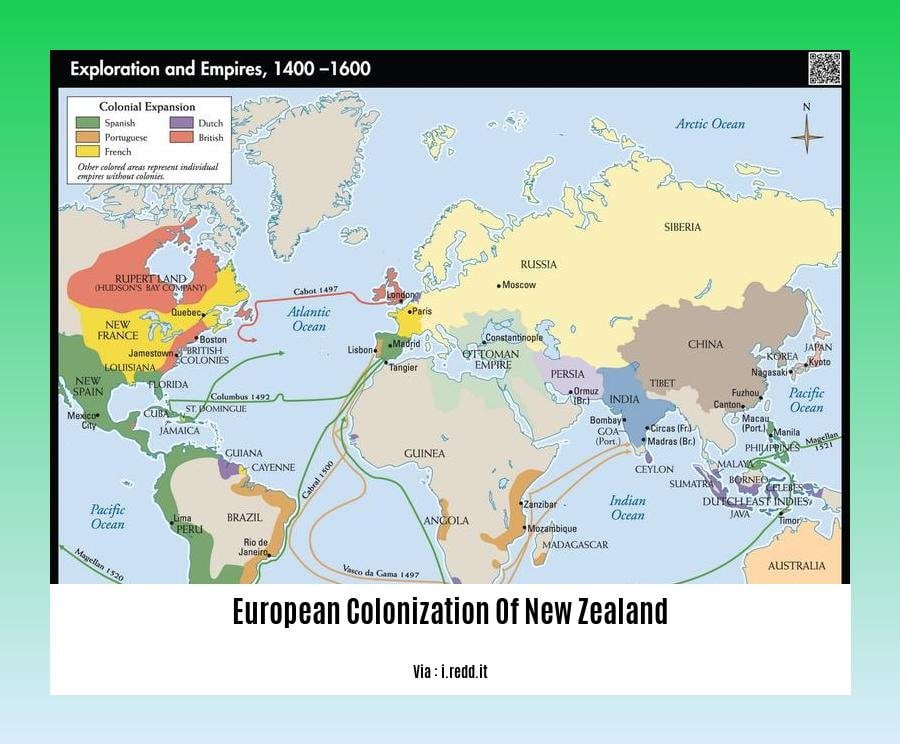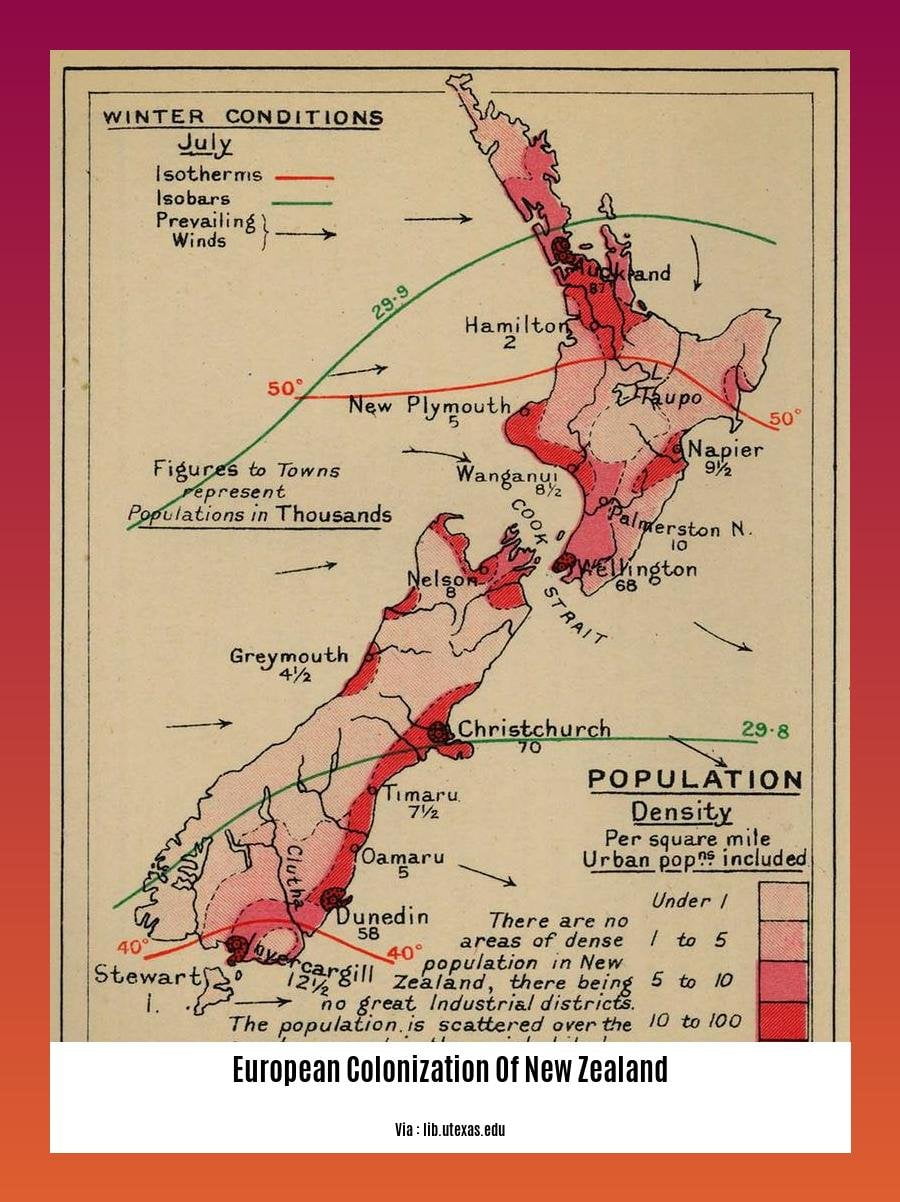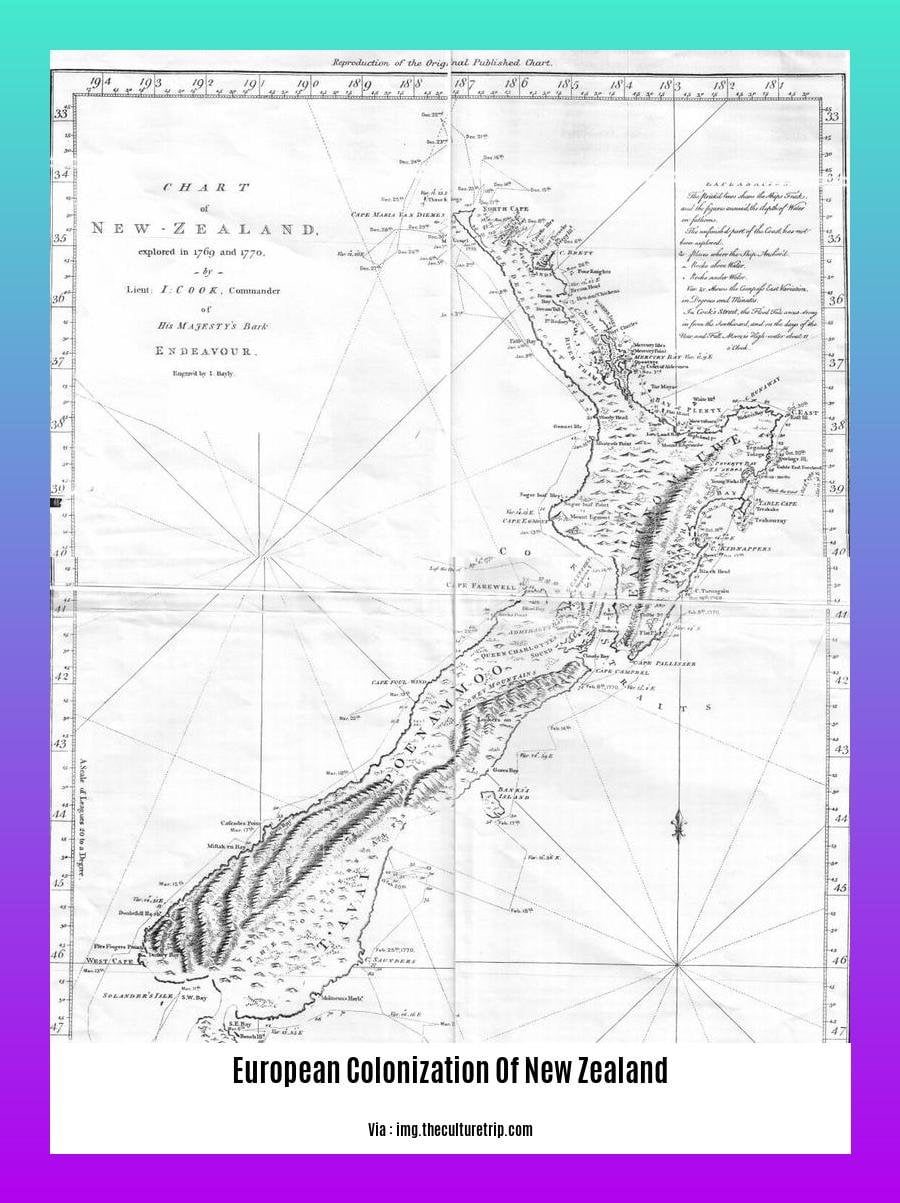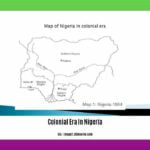Dive into the intriguing history of New Zealand through the lens of European colonization in our article “European Colonization of New Zealand: A Historical Perspective.” This exploration delves into the complexities and lasting impacts of this transformative period, shaping the nation’s identity, people, and culture. Join us as we unravel the layers of New Zealand’s colonial past.
Key Takeaways:
- European arrival in New Zealand (1769) encountered established Maori tribes.
- Musket Wars (1820s) sparked tribal conflicts among Maori.
- Treaty of Waitangi (1840) established British sovereignty and Maori rights.
- New Zealand became a British colony with Wellington as the main European settlement.
- New Zealand Wars marked conflicts between British forces and resisting Maori tribes.
- Economic expansion in the late 19th century focused on agriculture, benefiting farmers and urban areas.
European colonization of New Zealand

The European colonization of New Zealand, starting with James Cook’s arrival in 1769, brought immense change to the indigenous Maori population and the landscape.
Impact on Maori Society:
Land loss: The Treaty of Waitangi (1840) granted Maori certain rights, but British settlers acquired vast tracts of land, displacing Maori communities.
Disease and warfare: Introduced diseases and conflicts with settlers decimated Maori populations.
Social upheaval: Colonization disrupted traditional Maori social structures and introduced new cultural norms.
Economic Developments:
Agriculture: Sheep and cattle farming became the backbone of the colonial economy, transforming the landscape.
Gold rush: The discovery of gold in the 1860s sparked a population boom and further economic growth.
Cultural Changes:
Language and education: English became the dominant language, while Maori language and culture faced suppression.
Religion: Christian missionaries introduced their beliefs, influencing Maori spiritual practices.
Maori Resistance and Challenges:
Musket Wars: Inter-tribal conflicts intensified after the introduction of muskets.
New Zealand Wars: Maori tribes fought against British forces for sovereignty and control.
Treaty settlements: In the 20th century, the government began addressing historical grievances through treaty settlements.
Effects on the Landscape:
Deforestation: Extensive logging and farming practices led to widespread deforestation.
Invasive species: Introduced animal and plant species displaced native organisms.
Environmental degradation: Industrialization and mining activities polluted waterways and degraded ecosystems.
Want to discover the history of intravenous therapy? Click on this link and you’ll find amazing information.
For further learning, you can also check the future of intravenous therapy by clicking the link.
If you are interested in uses of intravenous therapy, just click this link and read the full guide.
For more interesting articles, you may also visit history of new zealand and New Zealand in the 20th century.
Land confiscations

The land confiscations of the 1860s formed an integral component of the colonial administration’s response to Māori resistance against British rule. Aiming to suppress the Kīngitanga movement, which advocated for Māori self-governance and prohibited land sales to European settlers, the confiscations were authorized under the New Zealand Settlements Act of 1863.
Key Takeaways:
- Land confiscations heavily impacted Māori, resulting in significant land loss and displacement.
- The confiscations were instrumental in quelling the Kīngitanga movement and consolidating British control over New Zealand.
- Māori continued to resist the confiscations through various means, including legal challenges and armed conflict.
- The long-term consequences of the land confiscations remain a contentious issue in New Zealand, with ongoing debates and discussions surrounding land rights and reparations.
Impact on Māori society
European colonization profoundly impacted Māori society, leaving lasting consequences that continue to shape New Zealand today. The arrival of European settlers brought both opportunities and challenges for Māori, transforming their way of life and social structures.
The introduction of new values, practices, and beliefs disrupted traditional Māori norms. Christianity weakened social cohesion by undermining traditional sanctions and prohibitions. Warfare and disease decimated the Māori population, further eroding their traditional way of life.
Key Takeaways:
- Warfare and disease devastated the Māori population.
- The introduction of new values, practices, and beliefs disrupted tribal structures.
- Christianity weakened social cohesion by undermining traditional sanctions and prohibitions.
Citation:
- Britannica: New Zealand
Legacy and contemporary issues
European colonization has left a lasting legacy and contemporary issues on New Zealand. The displacement of indigenous Māori communities, disruption of their culture, and loss of land continue to shape the nation’s identity and grapple with its colonial past. The impact of colonization extends beyond historical events, influencing present-day social, economic, and political dynamics.
Addressing these legacy and contemporary issues requires acknowledging the ongoing effects of colonization and working towards reconciliation and justice. This includes recognizing the rights of indigenous peoples, addressing land grievances, and promoting cultural revitalization. By confronting the complexities of colonialism’s legacy and contemporary issues, New Zealand can move towards a more equitable and inclusive society.
Key Takeaways:
- Colonization profoundly impacted indigenous Māori culture, leading to land loss, cultural assimilation, and widespread disruption.
- The legacy of colonialism continues to affect indigenous communities, with ongoing disparities in health, education, and economic opportunities.
- Addressing legacy and contemporary issues requires acknowledging the ongoing effects of colonization and working towards reconciliation and justice.
Most Relevant URL Source:
The Impact of Colonization on Indigenous Peoples
















